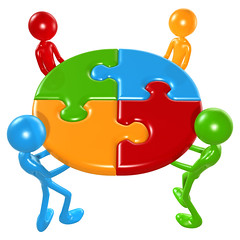Diversity For Overlooked Classes
Posted by Mitch Mitchell on Feb 4, 2013
A couple of weeks ago I had an interesting conversation with someone I know on Facebook, but not all that well. It came about because of a response by a transgendered young lady to President Obama's inauguration speech where he talked about inclusion of gays and lesbians. She wondered why he didn't mention transgendered people, and her mother encouraged her to do a response online about it.
 |
When I shared it with the lady I know, we got into a conversation on transgendered. To tell you the truth, I had to admit that I didn't know a lot about it, and hadn't ever really thought much about it. She told me that it's estimated that one in every 350 people born worldwide could be transgendered; that's an astounding figure.
A transgendered person is basically someone who believes they were born into the wrong body. At some point they decide to live as the sex of their choice, many times deciding to take medication or even go through surgery to change their sex. However, it's not a necessity for all. And the thing is that it has nothing to do with preference; they don't consider themselves gay or lesbian; they are who they believe they are, regardless of what anyone else believes.
Once I started thinking about that, I started thinking about how early in life some of those issues must have come to the forefront. I wondered how many boys there might have been back in my time going through these things and knew they had to keep them to themselves because, in the 70's, they'd have suffered great physical harm. I wondered how many gay people might have suffered for their beliefs as well, as I didn't meet my first gay person until I got to college.
I wondered how the heck I didn't know any until I got to college, or had to wait until I got into my 50's to really know what a transgendered person really was. I knew what a transsexual was because of Renee Richards the tennis player, but I'd always thought that it was just a small percentage of people who might have these types of feelings, like Chaz Bono, who I remembered as a little girl on the Sonny & Cher Show from the 70's.
Then I thought about the topic of diversity. Whereas whenever I do a live diversity presentation I bring everyone into play, I have mainly concentrated on racial discrimination. The numbers are higher when it comes to racial discrimination; I don't think anyone can deny that. After all, it's easy to see racial discrimination; skin color differences tend to stand out. And yet, that doesn't make it any easier for the folks in the LGBT community, does it? It doesn't make it any easier for people with tattoos and piercings in visible places either, even though that group seems to be more accepted now than even 10 years ago.
I came to the conclusion that even though this is Black History Month that the overall premise of the month is really to highlight any group that's been and still is discriminated against. I'm sure there were people further back in history that had to be gay, lesbian, bisexual or transgendered, or any of the other terms out there these days. And, it turns out that in some places it's also Gay or LGBT history month; works out well from where I'm sitting.
These are people we meet every day that we may not know about. These are people we might work with, or see in the store, or bowl with, or interact with almost anywhere at any time. Them and anyone else that's different, the disabled, the overweight, the skinny, the bald, the aged... think of someone and they probably belong on this list, the list of overlooked classes as I'm calling them.
Diversity is for everyone; fairness should be for everyone. It's not about acceptance or assimilation. It's not even about whether you like it or not. It's about being what it is, and what it should be; a world that judges character rather than appearance or belief. If it doesn't impact your life, leave people be, and treat them as equal.
As Forrest Gump stated, "And that's all I've got to say about that."


Wonderfully presented and thought provoking Mitch!
Thanks Amanda; I give it my best shot when I can. 🙂
I can’t say enough about this post Mitch. a remarkable piece–informative, passionate, and grounded in amazing empathy for people struggling against stereotype and discrimination.
This needs to be widely circulated.
Thanks Phil. It was on my mind and I just had to write about it. Everyone deserves a fair chance, no matter what.
This topic have been very hot in Thailand long ago, currently it seems to be normal and probably every 3rd boy in Thailand want to be a woman, but probably here it is just a fashion trend, not transgender but transexual, somethimes that even get a surgery.
I personally don’t understand that, but have to accept it as something normal, well it isn’t normal, but what is?
Carl, I’ve heard that it’s a lot more open there than here in the U.S. and you seem to be confirming this. I don’t know what’s considered normal anymore either, but acceptance over whatever someone chooses in this regard works for me.